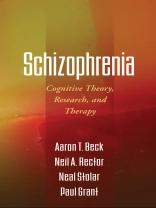From Aaron T. Beck and colleagues, this is the definitive work on the cognitive model of schizophrenia and its treatment. The volume integrates cognitive-behavioral and biological knowledge into a comprehensive conceptual framework. It examines the origins, development, and maintenance of key symptom areas: delusions, hallucinations, negative symptoms, and formal thought disorder. Treatment chapters then offer concrete guidance for addressing each type of symptom, complete with case examples and session outlines. Anyone who treats or studies serious mental illness will find a new level of understanding together with theoretically and empirically grounded clinical techniques.
Cuprins
1. Overview of Schizophrenia
2. Biological Contributions
3. A Cognitive Conceptualization of Delusions
4. A Cognitive Conceptualization of Auditory Hallucinations
5. A Cognitive Conceptualization of Negative Symptoms
6. A Cognitive Conceptualization of Formal Thought Disorder
7. Assessment
8. Engagement and Fostering the Therapeutic Relationship
9. Cognitive Assessment and Therapy of Delusions
10. Cognitive Assessment and Therapy of Auditory Hallucinations
11. Cognitive Assessment and Therapy of Negative Symptoms
12. Cognitive Assessment and Therapy of Formal Thought Disorder
13. Cognitive Therapy and Pharmacotherapy
14. An Integrative Cognitive Model of Schizophrenia
Appendices
A. Beck Cognitive Insight Scale (BCIS)
B. Scoring and Interpretation of the Beck Cognitive Insight Scale (BCIS)
C. Suggested Outline for Initial Psychological/Psychiatric Evaluation
D. Cognitive Assessment of Psychosis Inventory (CAPI)
E. Cognitive Triads for Delusional Beliefs
F. Cognitive Distortions Seen in Patients with Psychosis
G. Cognitive Distortions Specific to Psychosis
H. Thought Disorder Rating Scale (THORATS)
Despre autor
Aaron T. Beck, MD, is the founder of cognitive therapy, University Professor Emeritus of Psychiatry at the University of Pennsylvania, and President Emeritus of the Beck Institute for Cognitive Behavior Therapy. Dr. Beck is the recipient of awards including the Albert Lasker Clinical Medical Research Award, the Lifetime Achievement Award from the American Psychological Association, the Distinguished Service Award from the American Psychiatric Association, the James Mc Keen Cattell Fellow Award in Applied Psychology from the Association for Psychological Science, and the Sarnat International Prize in Mental Health and Gustav O. Lienhard Award from the Institute of Medicine. He is author or editor of numerous books for professionals and the general public.
Neil A. Rector, Ph D, is Director of Research, Department of Psychiatry, Sunnybrook Health Sciences Centre, Toronto, and Associate Professor of Psychiatry, University of Toronto. He is a Founding Fellow of the Academy of Cognitive and Behavioral Therapies and an editorial board member of several cognitive therapy journals, and conducts research on cognitive mechanisms and cognitive therapy treatments for psychiatric disorders. Dr. Rector has an active clinical practice and is also involved in training and supervision.
Neal Stolar, MD-Ph D, is a Medical Director and Director of the Cognitive Therapy for the Treatment of Psychosis Special Project at Project Transition in the Philadelphia area; a psychiatric consultant for Creative Health Services and Penn Behavioral Health; a researcher at the University of Pennsylvania’s Psychopathology Research Unit and Schizophrenia Research Center; and in private practice. Dr. Stolar is a Founding Fellow of the Academy of Cognitive Therapy. He has lectured internationally on cognitive therapy of schizophrenia.
Paul Grant, Ph D, is Director of Schizophrenia Research and a Fellow in the Psychopathology Research Unit, Department of Psychiatry, University of Pennsylvania. Dr. Grant’s research interests include cognitive psychopathological models of positive and negative symptoms as well as cognitive therapy of schizophrenia. He is the author of several journal articles and book chapters.












